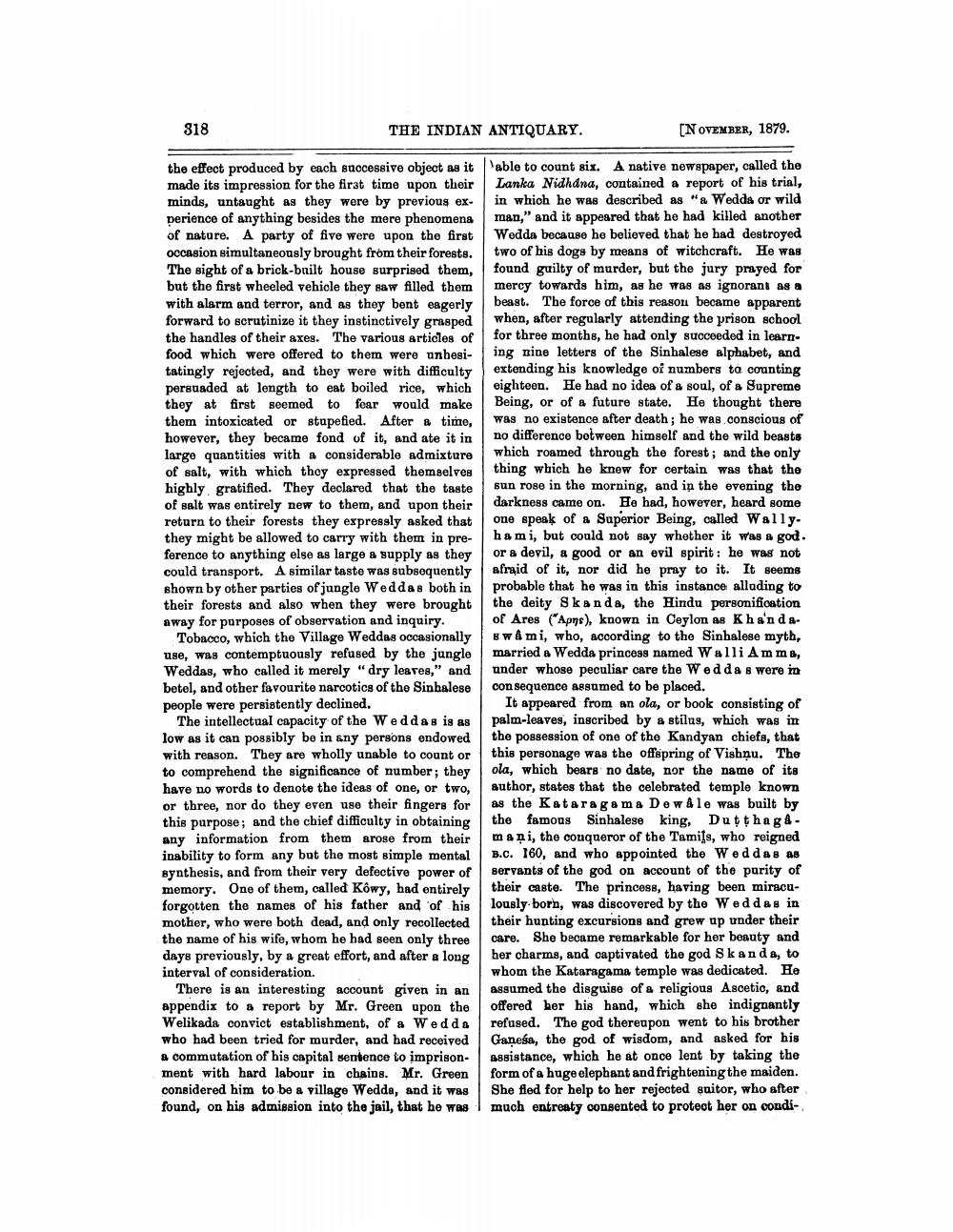________________
318
THE INDIAN ANTIQUARY.
[N OVEMBER, 1879.
the effect produced by each successive object as it made its impression for the first time upon their minds, untaught as they were by previous experience of anything besides the mere phenomena of nature. A party of five were upon the first occasion simultaneously brought from their forests. The sight of a brick-built house surprised them, but the first wheeled vehicle they saw filled them with alarm and terror, and as they bent eagerly forward to scrutinize it they instinctively grasped the handles of their axes. The various articles of food which were offered to them were unbesi- tatingly rejected, and they were with difficulty persuaded at length to eat boiled rice, which they at first seemed to foar would make them intoxicated or stupefied. After a time, however, they became fond of it, and ate it in large quantities with a considerable admixture of salt, with which they expressed themselves highly gratified. They declared that the taste of salt was entirely new to them, and upon their return to their forests they expressly asked that they might be allowed to carry with them in preference to anything else as large a supply as they could transport. A similar taste was subsequently shown by other parties of jungle Weddas both in their forests and also when they were brought away for purposes of observation and inquiry.
Tobacco, which the Village Weddas occasionally use, was contemptuously refused by the jungle Weddas, who called it merely "dry leaves," and betel, and other favourite narcotics of the Sinhalese people were persistently declined.
The intellectual capacity of the Weddag is as low as it can possibly be in any persons endowed with reason. They are wholly unable to count or to comprehend the significance of number; they have no words to denote the ideas of one, or two, or three, nor do they even use their fingers for this purpose; and the chief difficulty in obtaining any information from them arose from their inability to form any but the most simple mental Bynthesis, and from their very defective power of memory. One of them, called Kowy, had entirely forgotten the names of his father and of his mother, who were both dead, and only recollected the name of his wife, whom he had seen only three days previously, by a great effort, and after a long interval of consideration.
There is an interesting account given in an ppendix to a report by Mr. Green upon the Welikada convict establishment, of a Wedda who had been tried for murder, and had received a commutation of his capital sentence to imprisonment with hard labour in chains. Mr. Green considered him to be a village Wedda, and it was found, on his admission into the jail, that he was
able to count six. A native newspaper, called the Lanka Nidhana, contained a report of his trial, in which he was described as "a Wedds or wild man," and it appeared that he had killed another Wedda because he believed that he had destroyed two of his dogs by means of witchcraft. He was found guilty of murder, but the jury prayed for mercy towards him, as he was as ignorant as a beast. The force of this reason became apparent when, after regularly attending the prison school for three months, he had only succeeded in learning nine letters of the Sinhalese alphabet, and extending his knowledge of numbers to counting eighteen. He had no idea of a soul, of a Supreme Being, or of a future state. He thought there was no existence after death; he was conscious of no difference between himself and the wild beasts which roamed through the forest; and the only thing which he knew for certain was that the sun rose in the morning, and in the evening the darkness came on. He had, however, heard some one speak of a Superior Being, called Wally. hami, but could not say whether it was a god. or a devil, a good or an evil spirit: he was not afraid of it, nor did he pray to it. It seems probable that he was in this instance alluding to the deity Skanda, the Hindu personification of Ares ("Apne), known in Ceylon as Kha'n da. swami, who, according to the Sinhalese myth, married a Wedda princess named Walli Amme, under whose peculiar care the wedda s were in con sequence assumed to be placed.
It appeared from an ola, or book consisting of palm-leaves, inscribed by a stilus, which was in the possession of one of the Kandyan chiefs, that this personage was the offspring of Vishnu. The ola, which bears no date, nor the name of its author, states that the celebrated temple known as the Kataragama Dewale was built by the famous Sinhalese king, Dutthag&. maņi, the conqueror of the Tamils, who reigned B.C. 160, and who appointed the Weddas as servants of the god on account of the purity of their caste. The princess, having been miraculously born, was discovered by the Weddas in their hunting excursions and grew up under their care. She became remarkable for her beauty and her charms, and captivated the god Skanda, to whom the Kataragama temple was dedicated. He assumed the disguise of a religious Ascetio, and offered her his hand, which she indignantly refused. The god thereapon went to his brother Ganesa, the god of wisdom, and asked for his assistance, which he at once lent by taking the form of a huge elephant and frightening the maiden. she fled for help to her rejected suitor, who after much entreaty consented to protect her on condi




